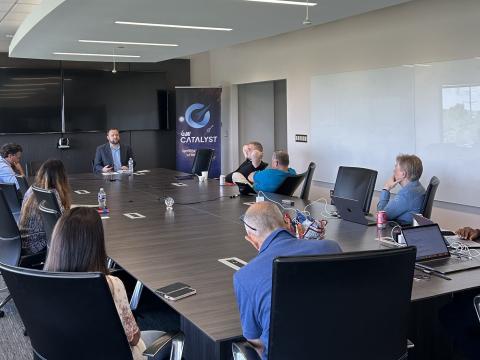The Bottom Line: Fewer Conferences? So What?
The cancellation of several military and government conferences is among the latest collateral damage of financial belt-tightening and looming additional defense budget cuts. But the real question is, “So what?” Read that question carefully. It does not mean, “What does it matter?” but rather “What do global security professionals do now to develop effective networks with the business sector?”
And, those are only two of the important questions raised by the reduction in the number of conferences during a time when cutting costs is crucial. Among the others are:
- How will military decision makers find the best technical solutions at the best price?
- How will they share their top priorities with the people who can help to meet them?
- How will companies know where to best invest their scarce research and development dollars?
Those three questions do not even scratch the surface. The real-life features of conferences have fulfilled needs in these areas for many years, and having fewer of them will leave gaping holes. Conferences are about communicating. Reducing the number of opportunities for effective, focused communications among government and industry professionals will have long-term effects.
The true value of association-sponsored events cannot be overstated. Outside their day-to-day surroundings, government customers and industry suppliers meet with a single purpose: to cost-effectively solve today’s problems and alleviate future ones. To this end, best practices are shared, requirements explained and options explored. Training and education, eye-to-eye contact, technology demonstrations and, yes, even intelligence gathering take place.
These opportunities are especially important in small businesses’ role in solving big problems. Government leaders have said time and time again that they need the innovation, agility and flexibility small businesses provide. But if their opportunities to reach out to these inventive pioneers in the one-to-many forums are limited, what then? Where else can they communicate their needs? How will small businesses ever mature?
Granted, the amount of money the government saves in travel and hotel expenses could be substantial. And, from the corporate standpoint, exhibiting at fewer conferences may mean less money spent on these as well as other expenses, including shipping exhibit materials. But at what cost to a company’s future? At what cost to the economy? At what ultimate cost to government agencies?
Undeniably, all associations, including AFCEA, have a stake in this latest turn of budget cutting for travel and events. For dozens of years, these organizations have been facilitating these forums for exchanging ideas, sharing information and experimenting hands-on with the technologies of the future. Their staffs have been choosing the best venue, scheduling top-level speakers and pouring though pounds of documents to determine the most relative discussion topics. And, their goals have gone far beyond stupendous profit margins or extraordinary fame. At the very heart of each conference they’ve sponsored, their aim has been to bring the government and business sectors together so people can connect and learn from each other. While they are well aware that technology facilitates information gathering and networking in ways it never has before, they understand that even technology has its limits when it comes to building trusted relationships.
The bottom line is that fewer conferences won’t only impact the financial bottom line. Was it time to take a hard look at travel budgets and fees? Perhaps so, but those funds have always been an investment in professional development, in network development and, in many cases, in future savings. The success of our military demonstrates that the return on that investment has been great. Fewer conferences? So what? A cost-conscious future is about to tell.



Comment
You raise the right topics regarding conferences
I appreciated your context here. The government has always had a hard time seeking balance on complex issues. The simple thing for government leaders to do is to issue blanket orders that can shut down everything. That really hurts. I helped pull together a conference a few weeks ago and many of the DoD attendees registered as private citizens and took leave so they could be there. That shows their dedication, but it is wrong for the government to make people do that.
Anyway, I think you really make good points here.
Attendees paying their own way
Yes, Bob, several of our staff attendees at WEST mentioned that gov personnel had taken time off and paid their own way to attend the conference. That's evidence that they see value in conference participation -- a value, it appears, the government doesn't want to acknowledge. John and Joe also have made good points, however. Conference sponsors must show HOW their events generate a return on investment AND take into consideration that this and future generations learn and network in much different ways than the industrial agers did. It's the "baby out with the bath water" and "cutting off the nose to spite the face" attitudes that bother me most. Government appears to have forgotten that despite the costs, conferences offer important benefits that are still very much needed.
How will agencies find best technical solutions
Maryann, as always, the right questions. There is an alternative to trade shows and conferences for agencies seeking to better understand the state of the market and innovations. From 50,000 feet, Gartner and IDC are excellent sources for keeping up with technology trends, especially with big companies. At a more practical level, DoD must re-invest in IT standards bodies and other communities of practice where real innovators and practitioners gather. Frankly, we had too many conferences and much time wasted on both sides, recognizing that the quality of exchange if very low. One alternative is the rise of public/private partnerships and shared innovation labs where real research is getting done. INSA's newest report support DNI's IC-ITE addressed these very issues, recognizing that the entire public sector IT market is less than 2% of the Global $3.8 Trillion dollar market. DoD can no longer afford to rely on these closed community events to gain access to commercial innovations and the wealth of lessons learned being made available through these communities of practice. This is the model that the IT Acquisition Advisory Council (IT-AAC) has matured, and proving out there is a better way in these lean times.
Evidence of our success is the reaction we are getting from some of the old guard "trusted advisers" who have little incentive or connections into the fast paced IT market. Congressional funding for these keep them artificially relevant, but this too will change when agencies realize the little value they are getting from these closed communities. Cloud and other COTS innovations are game changers and are forcing many in congress and the white house to re-evaluate DoD's over reliance on the current Defense Industrial Complex.
The Bottom Line: Fewer Conferences? So What?
Does industry really need to spend money to support/attend conferences to learn that the government has less money to spend with industry as I heard at WEST the last week of January? Also there is the considerable growth of industry/government conferences that even before the GSA debacle in Las Vegas and current budget cuts had government and industry executives talking about "conference fatigue." Then there is the open question about the value of the conference model were people travel to some site that can host a few 1000 attendees and people mill around exhibition floors and sit in large ball rooms listening to presentations. I don't see the next generation of government or industry leaders being very interested in attending this industrial age type of conference deep into the online everythings connected information age with mobile social media. My view is the conferences that survive this current downturn are the ones that have sufficien value for both industry and government and will continue - - - - but not necessarily based on physical presence. joemaz
Comments